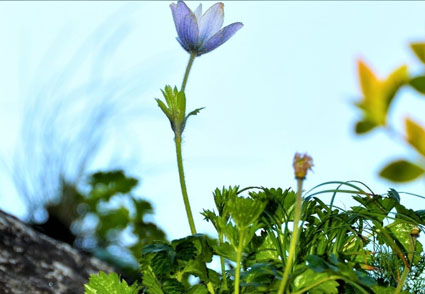Abstract
Pulsatilla saxatilis (Ranunculaceae), a new species from Fengcheng in Liaoning province, north-east China, is described and illustrated. Gross-morphologically this species is closely similar to P. chinensis in having 3-foliolate leaves, solitary, erect flowers, and persistent, prolonged styles in fruiting period, but differs by having light blue, whitish-blue or white (vs. violet) sepals and persistent styles 2–2.5 cm (vs. 3.5–6.5 cm) long. Pollen morphology also lends strong support for the description of the new species, with P. saxatilis having pantoporate pollen grains while its putative closest ally, P. chinensis, having tricolpate ones.
References
Li, Q.J., Su, N., Zhang, L., Tong, R.C., Zhang, X.H., Wang, J.R., Chang, Z.Y., Zhao, L. & Potter, D. (2020) Chloroplast genomes elucidate diversity, phylogeny, and taxonomy of Pulsatilla (Ranunculaceae). Scientific Reports 10: 19781. https://doi.org/10.1038/s41598-020-76699-7
Miller, P. (1754) The Gardener’s Dictionary, ed. 4. Privately published, London (unpaged).
Regel, E.A. (1861) Tentamen florae ussuriensis oder Versuch einer Flora des Ussuri-Gebietes nach den von Herrn R. Maack gesammelten Pflanzen bearbeitet. Mémoires de l’Académie Impériale des Sciences de Saint Pétersbourg, sér. 7, 4 (4): 1–228.
Sramkó, G., Laczkó, L., Volkova, P.A., Bateman, R.M. & Mlinarec, J. (2019) Evolutionary history of the Pasque-flowers (Pulsatilla, Ranunculaceae): Molecular phylogenetics, systematics and rDNA evolution. Molecular Phylogenetics and Evolution 135: 45–61. https://doi.org/10.1016/j.ympev.2019.02.015
Tamura, M. (1995) Pulsatilla Miller. In: Hiepko, P. (Ed.) Die Natürlichen Pflanzenfamilien, Band 17 a IV. Duncker und Humblot, Berlin, pp. 356–365.
Wang, W.T. (1980) Pulsatilla Adans. In: Anonymous (Ed.) Flora Reipublicae Popularis Sinicae, vol. 28. Science Press, Beijing, pp. 62–72.
Wang, W.C. (Wang, W.T.) & Bartholomew, B. (2001) Pulsatilla Miller. In: Wu, Z.Y., Raven, P.H. & Hong, D.Y. (Eds.) Flora of China, vol. 6. Science Press, Beijing, pp. 329–333.


